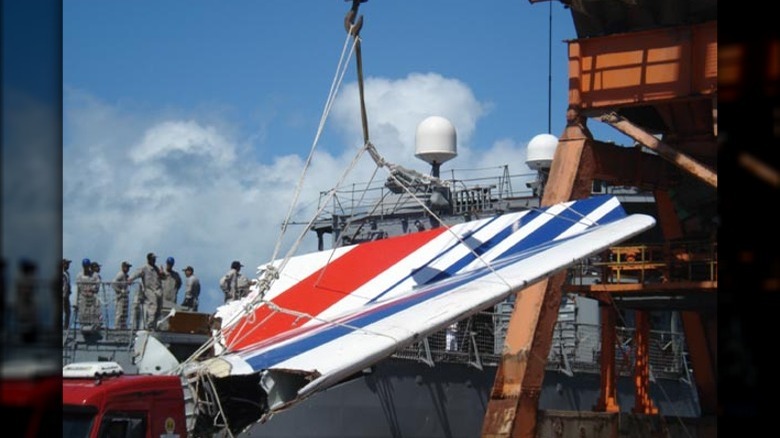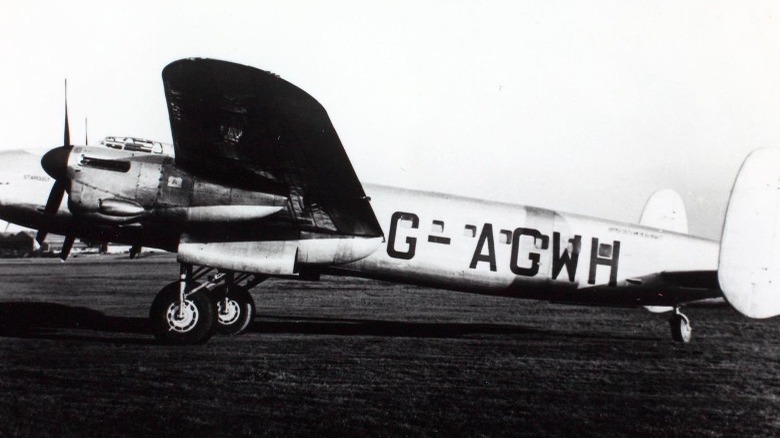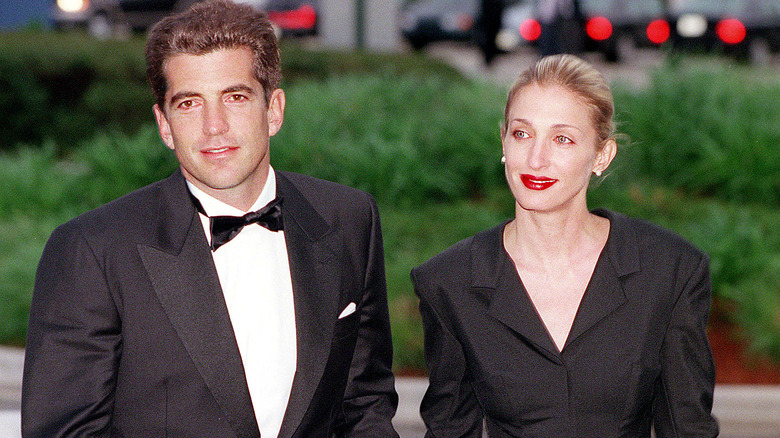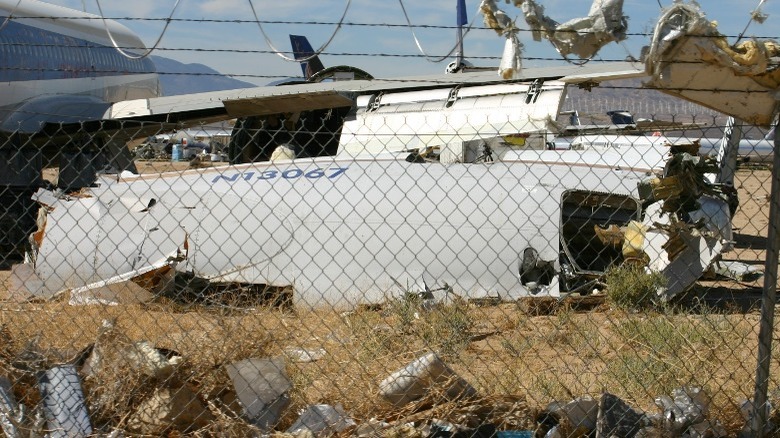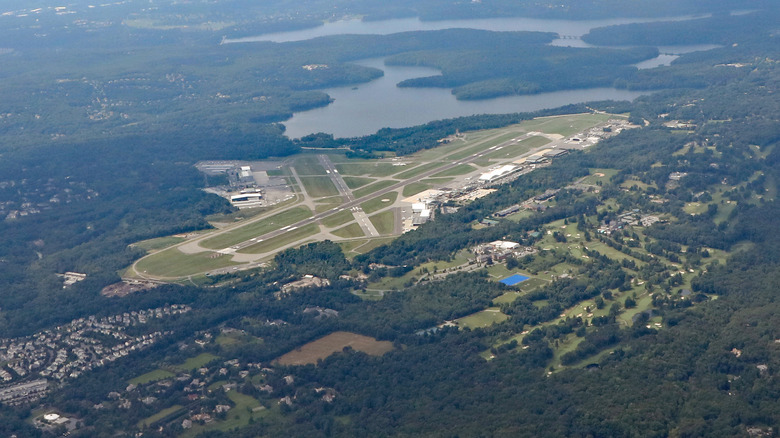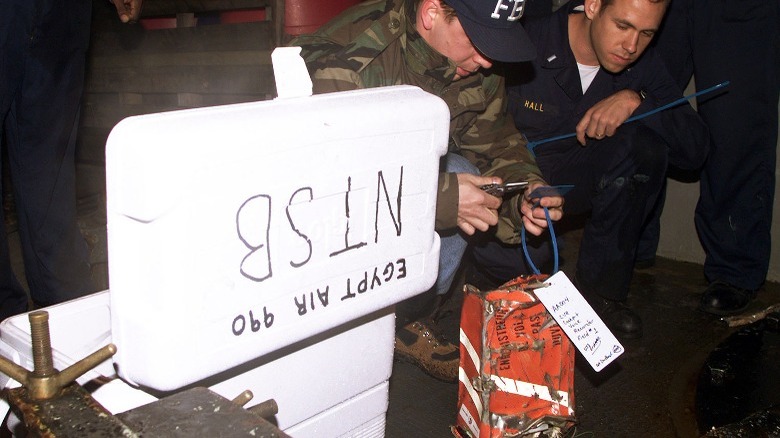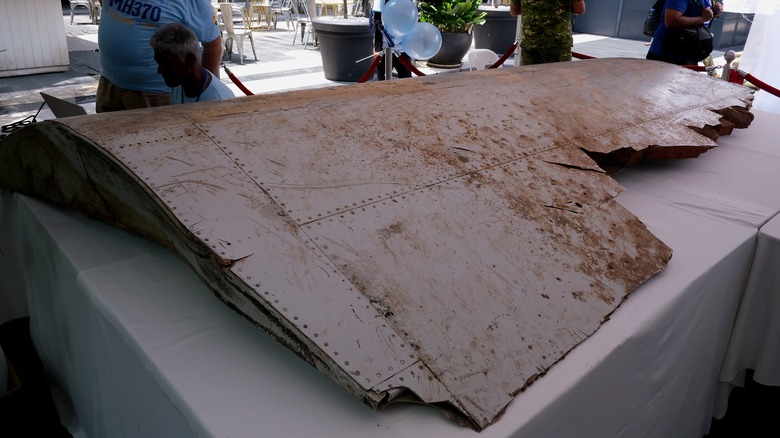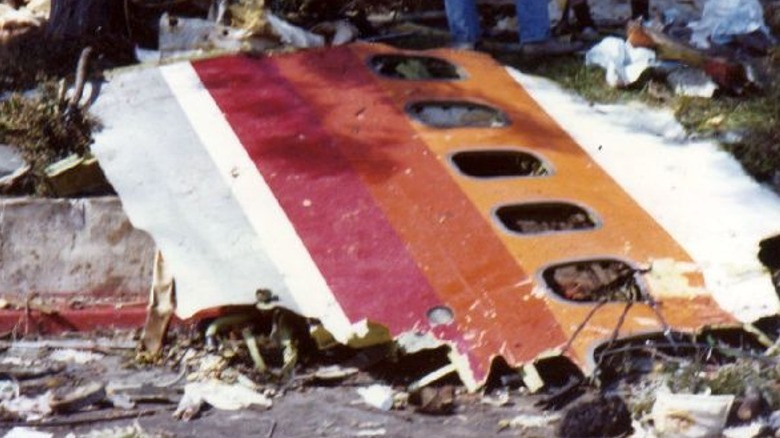These Final Airplane Crash Messages Are Haunting
The chances of surviving a plane crash are, statistically speaking, surprisingly good. Of course, that doesn't mean it's an absolute given, and sometimes the plane crash can be deadly.
It's in those cases that communications can be hauntingly final. Professionalism can fall by the wayside, emotions are raw and unfiltered, and sometimes, those last words are spoken by people who are absolutely and 100% aware of the fact that they only have a scant few moments left before the end.
Sometimes, those final words shed light on just what happened, tens of thousands of feet above the earth. It's a sobering thought that it takes only a split second for things to go terribly, horribly wrong — whether that's a mechanical failure, human error, or something more deviously pre-meditated. Even worse than the words themselves is the knowledge that sometimes, the final words of a single pilot represent not only the end of one life but the end of dozens.
Air France Flight 447
In 2009, Air France Flight 447 made headlines when it disappeared so quickly that it wasn't even able to send a distress signal. Over the course of the next two years, debris from the wreckage was fished from the Atlantic Ocean, leaving the families of passengers wondering what could have caused the catastrophic events that created France's worst airline disaster in their long aviation history.
According to Popular Mechanics, it was later determined that the plane flew into an unexpectedly violent storm, which interfered with instrument readouts showing things like airspeed and altitude. Mechanical failure continued, autopilot failed, and even as the human pilots scrambled to figure out what was going on, the plane went into what's called an aerodynamic "stall."
After the recovery of the black box and recorded conversation between the pilot and two co-pilots, it became clear that the storm and instrument failures kicked off confusion and disagreement between the pilots — particularly the inexperienced co-pilot. As the plane begins to descend, the more experienced of the two co-pilots is overheard saying, "We still have the engines! What the hell is happening? I don't understand what's happening." His co-pilot responds, "Damn it, I don't have control of the plane, I don't have control of the plane at all!" The captain tries to intervene, but then: "Damn it, we're going to crash ... this can't be happening!" The captain says, "Ten degrees of pitch ..." and then, nothing.
A decades-long mystery
In 1947, British South American Airways Flight CS-59 — also known as Star Dust — was heading to Santiago, Chile, when it disappeared just about four minutes before it was supposed to land. The flight's last communication was as much a mystery as its disappearance. The last words transmitted to the Los Cerrillos Airport were more accurately a last word: "STENDEC." When the airport requested clarification, it was repeated twice more — in Morse code — and then, the plane fell silent.
There have been a few theories as to what the Star Dust's crew meant. A frontrunner is that the crew was suffering from the effects of a depressurizing cabin, and jumbled the letters of the word "descent." Others say it may have been an acronym for something else, but opponents to the theory counter that if they were trying to send a distress call, they would have sent a simple SOS instead of something not immediately obvious.
The bottom line is that no one knows what it meant, but given that it was repeated in exactly the same way for three separate transmissions, it had to mean something... right? The remains of the Star Dust and the 11 people who were on board were finally discovered by hikers in 1998. According to The Guardian, the extreme climate preserved the bodies and the wreckage to a shocking degree, but left no clues as to what their final words may have meant.
I was trying to help
Pacific Airlines Flight 773 crashed in California's Tassajara Valley in 1964. According to The Mercury News, it took investigators days to piece together what happened. Their understanding started with the discovery of a .357 magnum handgun in the midst of the plane's wreckage, and when it was traced to Francisco Paula Gonzales, a picture started to emerge of a man who had hatched a deadly plan. Friends came forward to say they knew he had the gun and a plan to die by suicide, a claim that was supported by a casino worker in Reno. He'd said that it didn't matter what happened, as "it won't make any difference after tomorrow."
The final words of the pilots were recorded in the Civil Aeronautics Board's Aircraft Accident Report, and it's chilling stuff. A mere 26 miles from their destination, the recording captured the co-pilot saying, "Skipper's shot. We're been shot. Trying to help." Ground control's attempts to get them to repeat the message went unanswered, and it was later determined that Gonzales had entered the cockpit, shot and killed pilot Ernie Clark and copilot Ray Andress, and then died by suicide before the plane crashed and killed everyone on board.
If there is any silver lining to this tragedy, it's that it changed aviation moving forward. The incident led to a major overhaul of airline safety regulations, including legislation requiring locking cockpit doors and voice recorders in the cockpit.
The final flight of John F. Kennedy, Jr.
There's no denying the power of final words spoken with the panic that comes with the realization that death isn't just knocking on the door, but kicking it in. But the routine can be just as eerie because no one really wants to think about just how fast things can go from perfectly normal to catastrophic.
That seems to be what happened on the final flight of John F. Kennedy, Jr. He, his wife, (pictured), and his sister-in-law were planning on flying from New Jersey's Essex County Airport to Martha's Vineyard, then on to Hyannis Port. They were on the first leg of the journey when their plane disappeared. According to History, a later examination of the radar suggested that it took just 14 seconds for the plane to descend into dangerous territory. Their bodies were recovered five days later, and when no mechanical problems were found with the recovered plane, the official cause was deemed pilot error.
The fatal crash happened in 1999, but it wasn't until 2007 that air traffic transcripts were released to the public. Anyone hoping for some sort of explanation as to what happened was sorely disappointed, as Reuters reported that Kennedy's last words were the completely mundane confirmation of his plane's identification: "Five three November to two two, thanks."
The flight — and fall — of the Concorde
Once humankind got a handle on the principles of flight, it advanced to a certain point and just sort of stopped. International flights still take a surprisingly long time, and part of the reason for that is the complete and utter failure of the Concorde's attempts at supersonic commercial flights.
On July 25, 2000, Air France Flight 4590 was getting ready to take off on a flight that wasn't just an ordinary flight — it was an event that would kick off a three-hour-and-change trip from France to New York. It was over before it started: According to the Smithsonian, one of the Concorde's tires was punctured on the runway, and the high-speed blowout kicked off a chain reaction that ruptured one of the plane's 17 fuel tanks. Already traveling at a speed that now required takeoff, the flaming plane took to the air and came down just as quickly, killing everyone on board.
The final exchange between the ground and pilot Christian Marty was published as part of the BEA's investigation, reported the Irish Independent. After the ground relayed the terrifying message, "You have flames. You have flames behind you," the flight crew had just enough time to say they were going to try to cut the engines. But everything happened so fast, Marty's final words were, "Too late ... no time."
Last words from a small plane
The plane that crashed in New York's Westchester County in early 2023 carried just two people: pilot Boruch Taub and Binyamin Chafetz. According to Newsweek, their small plane was besieged with problems. After reporting they were having engine trouble, they requested an emergency landing at Westchester County Airport. But they never made it.
Chafetz's last words were sent to a WhatsApp group but were meant for his wife. "I love you and the kids," he wrote. "I am sorry for everything I have done. We lost engines. Call and have community say Tehilim."
The New York Post got a copy of the conversation between Taub and air traffic control, and over the course of nine minutes, the situation grew increasingly dire. Even as control told him that he needed to climb, Taub reported that he was rapidly losing oil pressure and power. Taub was unable to get his bearing, so the ground controller tried to guide him into turning around and backtracking to the nearest airport. Taub responded to the directions, saying, "If you can keep giving me vectors. I can't see a thing out here." Then: "Radar contact lost." The plane was about a mile from the airport when it crashed, and the remains of both men were recovered from the site.
Revealing a motive of revenge
The official cause of the crash of EgyptAir Flight 900 varies based on the investigation. While the Egyptian Civil Aviation Authority placed the blame on faulty control mechanism rivets, the American investigation into the fatal crash that happened not long after the flight's takeoff from JFK International Airport discovered something different. That investigation put the blame on co-pilot Gamil al-Batouti.
According to The Guardian, al-Batouti was in the middle of an investigation into accusations of sexual misconduct. Amid those accusations, he was told by EgyptAir exec Hatem Rushdy that he would no longer be assigned to international flights. Rushdy was on that ill-fated flight, and when the black box was recovered, investigators heard al-Batouti enter the cockpit and say, "I rely on God," before shutting off the autopilot and taking manual control of the plane.
That's when the steep descent started, and even though the captain made it back into the cockpit and took the controls — shouting, "What's happening, Gamil? What's happening? What is this? Did you shut the engines? Pull with me! Pull with me!" — the damage had been done even as al-Batouti continued to repeat: "I rely on God." The official transcript shows the recording stopped there, as the plane began to break up from the stress of the sudden descent and fight for altitude.
Eerie in normalcy
Everything about Malaysia Airlines Flight 370 was perfectly normal until it disappeared completely. The overnight flight was on the way to Beijing from Kuala Lumpur when it dropped off the radar just after midnight on March 8, 2014. Years later, things are still unclear. Louise Malkinson directed "MH370: The Plane That Disappeared" for Netflix, and explained to The Guardian, "It's the greatest aviation mystery of all time. This is a world where we have mobile phones and radar and satellites and tracking, and so to be nearly nine years down the line ... and still have so little is extraordinary."
Scores of theories about what happened have been put forward to explain what really happened that night in the skies over the South China Sea, ranging from conspiracies involving mysterious cargo to a murder-suicide plot.
And it's all made even stranger by the last communication from the aircraft, which was completely and utterly normal. Although initial reports claimed the final words heard from MH370 were, "All right, goodnight," the release of the final transcript revealed the words to have been perfectly ordinary: "Goodnight, Malaysian three seven zero."
A final message for a mother
On September 25, 1978, a deadly mid-air collision between Pacific Southwest Airlines Flight 182 and a Cessna Skyhawk resulted in the deaths of 144 people. The final death toll would include not only the two people in the Cessna and all of the passengers and crew of Flight 182 but also people on the ground when a San Diego suburb was turned into a crash zone. The scene was nightmarish, with one responding San Diego Police Academy trainee recalling (to San Diego Magazine, via the Independent): "All around us was the stench of kerosene and burning flesh. There were no faces on the bodies. There were no bodies to speak of — only pieces."
Transcripts of the recording made from Flight 182's black box are eerie. Warned of the presence of the Cessna, pilots lost sight of the smaller craft and asked, "Are we clear of that Cessna?" The others in the cockpit responded with, "Suppose to be," "I guess," and "I hope." Unfortunately, they were not as clear as they believed.
The impact was imminent, and it took just 17 seconds for Flight 182 to crash. In those seconds, voices from the cockpit are heard saying, "We're hit man, we are hit." The captain warns, "Brace yourself," and then, in the final second of the recording, someone can be heard saying, "Ma, I love ya!"
Germanwings Flight 9525
Eleven minutes passed between the end of radio contact with Germanwings Flight 9525 and the 400-plus mph collision with the French Alps. Even though it was unclear just what happened, initial reports were terrifying. According to the first statements from the French air accident bureau's Remi Jouty (via the Independent), the plane's descent was likely "compatible with an aircraft still under pilot control," and there were no signs of an explosion or malfunction that may have explained the crash.
It was only after the discovery of the black box that things became clear, and in a press conference covered by the Independent, Lufthansa officials shared what they had learned. When the flight's captain left the cockpit, the co-pilot locked the doors, took control of the plane, and directed it into a descent that killed everyone on board.
The German newspaper Bild am Sonntag published the final words heard on the recording (via The Telegraph). After returning to the cockpit to find he was locked out, the captain was heard pounding on the door and — as the doomed plane's final descent started, he began to shout, "Open the damn door!" Even as the captain took an axe to the door in an attempt to gain access to the cockpit again, the recording captured the screaming of passengers and blaring alarms.
The flight brought down by a disgruntled ex-employee
It took about a month before the Los Angeles Times reported that authorities had focused on ex-USAir employee David Burke as a person of interest in the crash of Pacific Southwest Airlines Flight 1771. Among the passengers on the flight was USAir LAX manager Ray Thomson, and the running theory was that Burke boarded the plane with the intent of killing him.
Several weeks after the discovery of the black box, authorities released more information. Burke was believed to have taken a .44 Magnum on board with him. Documented on the recording of the final moments of the plane's flight were three gunshots. The gunshots came immediately after someone was heard warning the pilots, "We have a problem here." Then, a voice believed to be Burke responded, "I'm the problem."
Burke also left behind some final thoughts that were written on an air sickness bag that miraculously survived the crash and was discovered by investigators. Thought to have been given to Thomson in the moments before the shooting, it read, "Hi, Ray. I think it's sort of ironical that we ended up like this. I asked for some leniency for my family. Remember? Well, I got none and you'll get none."

